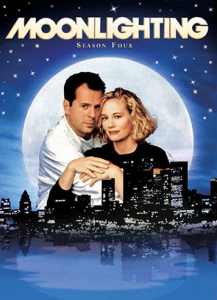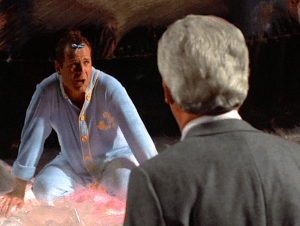Welcome to another Wildcard Wednesday and the conclusion of our coverage on the best of Moonlighting (1985-1989, ABC)! Over the winter holidays, I had the opportunity to screen — mostly for the first time — the complete series of this iconic detective drama/romantic comedy that relaunched Cybill Shepherd’s career and helped rocket Bruce Willis to stardom. As star-crossed, or moon-crossed, partners, David Addison and Maddie Hayes’ rocky will-they-won’t-they dynamic made the show more than your typical murder mystery procedural. But from the start, the series was plagued by production delays that yielded a far smaller episodic output than ordered by ABC. (This meant a lot of material thrown to Allyce Beasley as the quirky receptionist, Agnes, and Curtis Armstrong as her goofy love interest, Bert, who had to pick up the slack and allow time off for Shepherd and Willis, both of whom developed reputations of difficulty.) Over four-and-a-half years, only 65 hours were produced, plus a two-hour TV movie pilot. The show was in reruns far more than any other on the network, and this began to define the series even more than the romance. We’ve already covered the best from the first three seasons; today — Seasons Four and Five!
I must reiterate what I wrote in our prior entries: “I’m not your typical… fan. While I absolutely believe the dynamic between Maddie, the former model who discovers she owns a detective agency, and David, the fun-loving investigator who melts her icy exterior, is what makes this show special, I also do not believe that a great episode of Moonlighting is dependent on heavy relationship-oriented story points. In other words, I prefer a script in which their interaction is inspired by the weekly happenings; I don’t need the weekly happenings to be about their interaction. The show works best when an episodic mystery exists in the same space as the couple’s chemistry-popping banter. Offerings in which the sole plot deals with their tiring and occasionally sappy back-and-forth dynamic generally disappoint, because the show never handles their ‘relationship’ in a completely believable or satisfying manner. This is because David and Maddie live and breathe based on the will-they-won’t-they tension, and that usually works best when it’s more subtextual than ‘maintextual.’ Furthermore, a fantastic Moonlighting balances goofy slapstick with high-stakes emotional drama, something that’s so difficult to accomplish… As a result, finding a good episode of this series is harder than it should be. It’s an unfortunate truth that more episodes miss than hit. But, and this I believe wholeheartedly, the hits are worth all the misses.”
Let’s cut to the chase. Season Four, which consists of 14 episodes, is when the show goes bad. As I mentioned last time, the problem’s not that Maddie and David sleep together; it’s that immediately after they sleep together, Maddie is convinced that they shouldn’t be sleeping together. This is particularly nonsensical because, aside from her having spent the last three seasons developing feelings for David and pushing against her desire to act upon them, the show also decides to use Maddie’s misgivings as an excuse to break them up without ever giving the audience a chance to see them as a couple, which would have have allowed us to understand why Maddie felt as such. (Cheers had the common sense to give us a wonderfully excruciating season of Sam and Diane together, therein proving to the audience why they needed to be apart). Another big part of the Season Four problem is that Shepherd got pregnant and Willis got Die Hard, necessitating that Maddie and David spend over half the season in separately shot scenes. And for a show built around the chemistry shared by its lead actors, the inability to have said lead actors shooting together is quite damning. Furthermore, the year was mired by off-screen conflict, as Shepherd and creator Glenn Gordon Caron reached an impasse, resulting in the latter’s departure. This, of course, was around the time that the show made the decision to have the cautious Maddie impulsively (and unmotivatedly) marry a stranger — you know, instead of choosing on of the two men that could be the baby’s father. Oh, yeah, I forgot to mention: Maddie is pregnant. And as regular readers of this blog know how I feel about babies/pregnancy/accompanying sentiment, I’ll just say that the beat is used sans purpose.
Fortunately, the show seems to have realized the ridiculous futility of the baby storyline after the fourth season wrapped (an episode early, due to the 1988 Writers Strike), as the 13-episode fifth season opens with a gimmicky episode that glibly culminates in Maddie miscarrying. Yes, this dramedy decided to feature a co-lead character having a miscarriage — yet what could have been commendably bold is rendered disastrous, as there are no repercussions from the event. Okay, she and David break down in an elevator in the following episode, but after that, nada. So while I like that Moonlighting got themselves out of the figurative baby box, and think the premiere itself is well-made (for this point in the show’s run anyway), the arc is ultimately insensitive and a rotten way to begin the year. After this, the rest of Season Five attempts to recapture the easy breezy Season Two quality, which is never truly invoked. So after pulling low ratings, the show was put on a network ordered hiatus, until it returned in an awful Sunday night timeslot. The end was obviously nigh. Moonlighting ended in the spring of 1989, with Maddie and David NOT getting together as they learned that their show has been canceled because “romance is a very fragile thing.” It’s actually a decent end for a series that had been less than decent for several years.
Nevertheless, here are my favorites from Seasons Four and Five, listed in airing order — with the two-hour pilot considered one installment (and remember, I’m not like most fans…)
Season Four (1987-1988)
01) Episode 50: “Eek! A Spouse” (Aired: 02/09/88)
While Maddie attempts to get a reaction from David about her marriage, the duo takes a case.
Written by Ron Osborn, Jeff Reno, Roger Director, Kerry Ehrin & Charles Eglee | Directed by Artie Mandelberg
This is the second fourth season episode in which David and Maddie appear on screen together (aside from the season premiere, which was shot incredibly early in the summer of ’87) and it’s the only offering this season that attempts to reclaim the style and feel of the early years, in which the relationship material between David and Maddie is balanced out by an involved case. There’s a crazy chase, some big slapstick, and several meta-theatrical moments — I gotta give points to them for trying.
02) Episode 51: “Maddie Hayes Got Married” (Aired: 03/01/88)
David decides to throw Maddie and Walter a wedding.
Written by Charles Eglee & Roger Director | Directed by Paul Krasny
One big farce, many aficionados of this series cite this offering as the finest from the fourth season (high praise, he noted sarcastically). Truthfully, this is among the funnier offerings from the latter half of the series’ run, but it’s very story-heavy, as it leads to what will eventually be the break-up of Maddie and her four-episode husband, Walter. Also, the small trivial subplot of David and his Lamaze partner Terri is resolved as she has her baby. It’s a screwball comedy — but is it Moonlighting?
Other notable episodes from the fourth season that weren’t highlighted above include: “A Trip To The Moon,” the season premiere and the only time that Willis and Shepherd share the screen together until “Tracks Of My Tears,” when Maddie makes the unmotivated decision to marry a man she just met.
Season Five (1988-1989)
03) Episode 58: ‘Shirts And Skins” (Aired: 01/17/89)
Maddie and David find themselves helping opposite sides of a lawsuit.
Written by Roger Director | Directed by Artie Mandelberg
The diehard fans of the series can cite this one as another classic, but let’s be honest: nothing from the final two years is up to the calibre of the best from Seasons Two and Three. This is another story-heavy installment that most enjoy as a result of its ostentatious premise, which finds the office divided along gender lines when a case comes in about a woman shooting her boss after she claims he sexually harassed her. It’s pretty by-the-number, but it works for the series and isn’t noticeably false.
04) Episode 60: “I See England, I See France, I See Maddie’s Netherworld” (Aired: 02/14/89)
Maddie and David are mixed up in a case when a man dies in her office.
Written by Chris Ruppenthal | Directed by Paul Krasny
With the exception of the second honorable mention listed below, this is probably the gaggiest episode of the final season. Almost every moment of this script is aimed at making its audience combust into laughter, and coupled with the knowingly grim premise, this outing seems most poised to capture the sense of humor of the early much less-melodramatic era of the show’s run. Maddie’s dream sequence is supposed to be the climax, but the best stuff comes in the cemetery (see picture).
05) Episode 65: “Eine Kleine Nacht Murder” (Aired: 04/30/89)
Maddie is placed under police protection after witnessing a murder.
Written by Barbara Hall | Directed by Jay Daniel
You know what? A lot of fans don’t like this, the penultimate episode of the series, for it features the second appearance (out of three) of Virginia Madsen as Maddie’s cousin and David’s new love interest. Her arc is comparable to Mark Harmon’s, only it doesn’t build to anything as exciting. (In fact, it doesn’t build to anything.) But I actually enjoy this one, for it gives us a story that we haven’t seen before. Furthermore, it’s fast-paced and features a lot of kooky character moments. Unique.
Other notable episodes from the fifth season that weren’t highlighted above include: “A Womb With A View,” the infamous season premiere in which the show finds a way to get rid of Maddie’s baby, “Plastic Fantastic Lovers,” which has Jennifer Tilly as a guest star and some goofy laughs, and “Take My Wife, For Example,” which has an interesting premise (but only an average execution).
Come back next Wednesday for a new Wildcard post! And tune in on Monday for another forgotten musical!












How ironic is it that we’re discussing the final two seasons of “Moonlighting” on the same week as the final episode of “Castle,” a series that certainly owes a debt or several to the former.
Hi, Rashad! Thanks for reading and commenting.
I made the same comparison during a discussion with a CASTLE fan (which I am not) last week. The parallels are many!
I’m glad to know I’m not the ONLY one who never cared for “Castle”!
As much as I enjoyed “Moonlighting” overall, I must admit that my opinions about the show’s last two seasons are not dissimilar from yours, and vice-versa. And by “not dissimilar,” I mean, “on the nose.”
I think being a MOONLIGHTING fan ultimately requires a deliberate effort because there’s little gold to be found outside the series’ golden era, and because this halcyon period is comparably short-lived (especially in light of the production’s chronic failure to meet its episodic orders), one has to constantly justify the bevy of lesser moments — and years, even.
This is doable when we pick and choose seminal scenes and episodes to remember with fondness, because there are quite a few, but the series’ inconsistency is incredibly problematic when attempting to view MOONLIGHTING in the “big picture” context. As with a handful of the shows I’ve covered here, my enthusiasm in discussing the series progressively waned once the peak gave way to a steep drop. But, unlike viewers of the time, we now have the luxury/curse of knowing the series’ full creative arc — and we can better prepare ourselves for the inevitable disappointment.